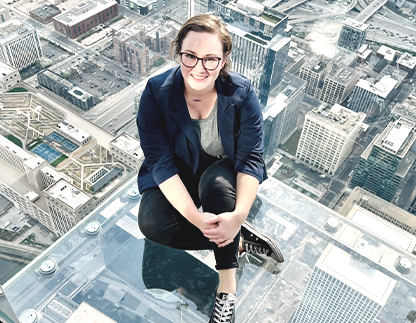Students are the reason why I persist in this work even as many states are passing legislation to ban diversity, equity, and inclusion in education.”
Diane Codding
Postdoctoral Scholar in the Department of Physics and Astronomy

Diane Codding is a postdoctoral scholar in the Department of Physics and Astronomy in the Weinberg College of Arts and Sciences. She specializes in issues of diversity, equity, inclusion, and justice (DEIJ) in science, technology, engineering, and math (STEM) education. Her current work focuses on developing, implementing, and researching professional development for STEM higher education faculty. Diane previously served as the social subcommittee chair for the Northwestern University Postdoctoral Association (NUPA).
What do you find both rewarding and challenging about your research and/or work?
The most rewarding part of my research is working with students because they are passionate, brilliant, and kind. People like to complain about the ‘younger generations,’ but I find working with students to be an absolute joy. Students are the reason why I persist in this work even as many states are passing legislation to ban diversity, equity, and inclusion in education.
It is challenging to know that there are people actively seeking to limit the impact of my research, especially as an early career scholar. However, I am inspired by the words of John Lewis, the late civil rights activist and U.S. politician: “Do not get lost in a sea of despair. Be hopeful, be optimistic. Our struggle is not the struggle of a day, a week, a month, or a year, it is the struggle of a lifetime. Never, ever be afraid to make some noise and get in good trouble, necessary trouble.”
How do you unwind after a long day?
I spend a lot of my free time making pottery in the ARTica Ceramics Studio. I love having a creative outlet where I am not worried about how my work will be received, nor the inevitable negative comments from Reviewer #2. I can be creative, make mistakes, and gift the slightly wonky mugs to my friends and family.
What books are on your bedside table?
I am currently reading The Last Nomad: Coming of Age in the Somali Desert, a gripping memoir by Shugri Said Salh. Next, I will be reading Remarkably Bright Creatures by Shelby Van Pelt, which is the NUPA Book Club selection for February.
What did you originally want to be when you grew up?
Indiana Jones. Who wouldn’t want to grow up to be a respected professor with a cool hat who gets to travel the world and punch Nazis in the face? I would like to think I am still on track to achieve this childhood dream, though I will likely let my research do the ‘punching.’ I may never be as cool as Harrison Ford, but I’m sure a good hat would help.
Tell us about a current achievement or something you're working on that excites you.
I am excited about my collaborative work with Inclusive Graduate Programs, a National Science Foundation’s (NSF) Alliances for Graduate Education and the Professoriate (AGEP) Pilot in Physics & Astronomy. Physics is among the least diverse disciplines in higher education, despite recent incremental advancements toward greater diversity. This project seeks to initiate deep and systemic change in a cohort of 16 R1 physics departments through improving equitable program practices and changing the mindsets of those who continue to hold deficit views on the science competency of marginalized and minoritized students.
I look forward to supporting physics graduate programs as they seek to become more inclusive and equitable, with a specific focus on creating and sustaining a welcoming and supportive environment, specifically for historically excluded groups.
Publish Date: January 30, 2024
If you know a graduate student, postdoctoral scholar, graduate faculty member, staff member, or a member of our TGS alumni population who would make a great candidate for our TGS Spotlight Series, please complete this brief TGS Spotlight Series Nomination Form.